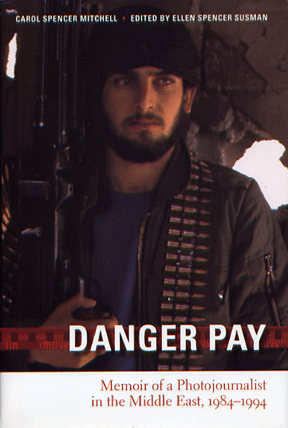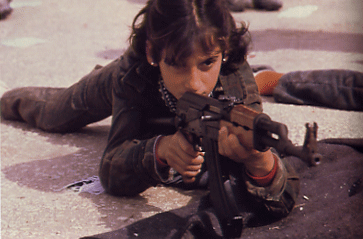
[Webshaykh’s note: Carol Spencer Miller (1954-2004) worked as a photojournalist in the Middle East, covering the crises there for some of the major American and european journals and newspapers. She had access to the elites, including King Hussein and Yassir Arafat, as well as ordinary people. Although she died before publishing her reflections on this experience, her book has been edited by her sister as Danger Pay: Memoir of a Photojournalist in the Middle East, 1984-1994 and is now available as an intriguing first-person memoir of events that seem to recycle more than disappear from the news cycle. I provide here an excerpt about her feeling of disorientation reporting on the Israeli/Palestinian issue.]
It grows increasingly unclear to me why people call this a “Westernized†country. the phones don’t work, the press is censored, there are guns everywhere. I am perpetually uneasy. How, I wonder, can anyone relax when wherever you look, there is someone toting or pointing a machine gun? they casually rest across shoulders, carried by anybody who wants to. Will I get used to the sight of civilians wearing sandals, shorts, T-shirts, and Uzis. in movie theaters, at the supermarket, at shopping malls, and at bars? They aren’t frightening as much as disconcerting.
This is a difficult country to get accustomed to. There are bomb shelters in homes and children’s playgrounds, security at every store, the ever-present notion of “security reasons,†the way people dress, as if they don’t give two hoots about appearance (they don’t). Restaurants and movies open on Fridays are stoned by the ultra-Orthodox Haredim.

Girl with gun, PLO camp, Lebanon, 1986: Photograph by Carol Spencer Mitchell
Then there is the noise: Israelis always screaming, shoving, and arguing. Sometimes at night the sonic boom of fighter jets, a bevy of sirens, or an abnormally loud explosion wakes me from sleep. I wonder if something’s happened and whether I should get dressed, grab my cameras, and chase the noise through the streets.
Pedestrians here smack of arrogance. When I drive, they dare me to hit them. Both Arabs and Jews. They cross the road as if in an act of defiance, their heads twisted deliberately toward me, accusation in their stony eyes: “Here I am. and even if you run me over, you cannot remove me. My body will claim this soil through the grave.â€
There is constant talk of survival. A land to be shared, a country to be shattered. In the newspapers, on the streets. Everyone is obsessed. an Arab is shot, a Jew is stabbed. The appropriate demonstrations ensue. Palestinian youth, their rebellious features masked in black-and-white keffiyehs, flaunt PLO flags lages, shattering windows and slashing tires. The Israeli army sprays tear gas and rubber bullets. Towns are put under curfew. The wounded are taken to hospitals. Arrests are made. This is the news.
I have no understanding of this place, nothing to fit it into. I am confused and disoriented, trying to feel my way. Nothing here is easy. It is a place where you wake up and never know what will happen. A place of emotions, of spirit, of passion, of madness, and an awesome beauty, engulfed by a past too old to recognize, yet too familiar ti lay quite within me. Why does this land make me quiver?
Beneath all the smells, the images, and the noise, there is a silence, the type of silence that brings everything to a standstill. A stubborn silence. A silence of struggle, of tension, of questions that remain unanswered. How long will we be here (Israelis); and how long can we remain like this (Palestinians)? It is this silence I want to photograph.
It grows increasingly unclear to me why people call this a “Westernized†country. the phones don’t work, the press is censored, there are guns everywhere. I am perpetually uneasy. How, I wonder, can anyone relax when wherever you look, there is someone toting or pointing a machine gun? they casually rest across shoulders, carried by anybody who wants to. Will I get used to the sight of civilians wearing sandals, shorts, T-shirts, and Uzis. in movie theaters, at the supermarket, at shopping malls, and at bars? They aren’t frightening as much as disconcerting.
This is a difficult country to get accustomed to. There are bomb shelters in homes and children’s playgrounds, security at every store, the ever-present notion of “security reasons,†the way people dress, as if they don’t give two hoots about appearance (they don’t). Restaurants and movies open on Fridays are stoned by the ultra-Orthodox Haredim.
Then there is the noise: Israelis always screaming, shoving, and arguing. Sometimes at night the sonic boom of fighter jets, a bevy of sirens, or an abnormally loud explosion wakes me from sleep. I wonder if something’s happened and whether I should get dressed, grab my cameras, and chase the noise through the streets.
Pedestrians here smack of arrogance. When I drive, they dare me to hit them. Both Arabs and Jews. They cross the road as if in an act of defiance, their heads twisted deliberately toward me, accusation in their stony eyes: “Here I am. and even if you run me over, you cannot remove me. My body will claim this soil through the grave.â€
There is constant talk of survival. A land to be shared, a country to be shattered. In the newspapers, on the streets. Everyone is obsessed. an Arab is shot, a Jew is stabbed. The appropriate demonstrations ensue. Palestinian youth, their rebellious features masked in black-and-whie keffiyehs, flaunt PLO flags lages, shattering windows and slashing tires. The Israeli army sprays tear gas and rubber bullets. Towns are put under curfew. The wounded are taken to hospitals. Arrests are made. This is the news.
I have no understanding of this place, nothing to fit it into. I am confused and disoriented, trying to feel my way. Nothing here is easy. It is a place where you wake up and never know what will happen. A place of emotions, of spirit, of passion, of madness, and an awesome beauty, engulfed by a past too old to recognize, yet too familiar ti lay quite within me. Why does this land make me quiver?
Beneath all the smells, the images, and the noise, there is a silence, the type of silence that brings everything to a standstill. A stubborn silence. A silence of struggle, of tension, of questions that remain unanswered. How long will we be here (Israelis); and how long can we remain like this (Palestinians)? It is this silence I want to photograph.
Excerpt from Carol Spencer Mitchell, Danger Pay: Memoir of a Photojournalist in the Middle East, 1984-1994. Edited by Ellen Spencer Susman. (Austin: University of Texas Press, 2008), pp. 13-14.